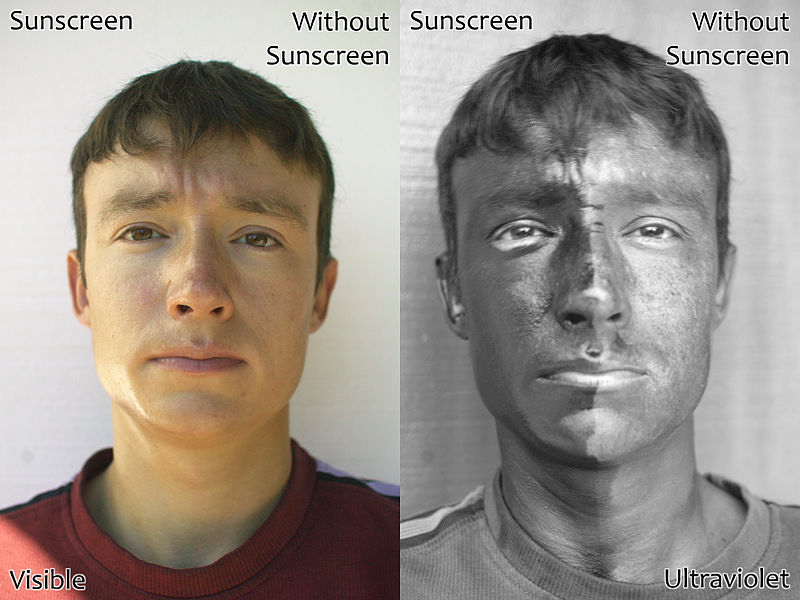I'm not a big fan of introductions, so I'm not going to write one! Here's why you need to wear sunscreen every day, even if you're not going to the beach.
1.) Sunscreen works by creating a reaction pathway that transforms light energy from the sun into heat energy that dissipates safely around your skin. This is like how an asphalt driveway turns the sun's light into heat, which makes you feel hotter when standing on the driveway. The heat is totally harmless, but it may cause you to sweat some of your sunscreen off, which is one reason why it's important to reapply regularly!

2.) Humans can have a natural SPF (Sun Protection Factor) of up to 15 depending on how dark your skin is. This explains why African-Americans often escape the effects of sun damage, even if they don't apply sunscreen regularly. However, this natural SPF also means that darker-skinned people need to spend more time outside every day to absorb the necessary amount of Vitamin D from the sun.
3.) Snow and ice don't mean that the sun isn't able to damage your skin. In fact, the earth reaches perihelion (it's closest point to the sun) in early January of each year. That means that UV rays are actually even more intense in the winter! And if that weren't crazy enough, the shiny white snow and ice actually reflects light from the sun, which allows the UV rays to take another pass at your skin even after reaching earth!
4.) When you're only outside for a little bit every day, like walking to and from class, it's easy to justify why you don't need to wear sunscreen, because you can't see the damage to your skin. In reality, most skin damage occurs in a spectrum not visible to the human eye. Even people with seemingly healthy skin can become victims of melanoma and other skin cancers. This image shows a patient's face in normal light and under a black light.

5.) Another thing to consider is that SPF only takes protection from UVB (Ultraviolet Burning) rays into consideration. You need to select a broad-spectrum sunscreen with a high UPF (Ultraviolet Protection Factor) to mitigate UVA (Ultraviolet Aging) rays, which have been proven to cause skin aging and are a larger factor in cancer development.
There you go, now you have a bunch of great reasons why you should be wearing sunscreen every single day! Plus, who doesn't love that smell?
Cheers,
Kelley
Sun damage isn't necessarily visible at eye level. This image from the University of Colorado Cancer Center shows a melanoma survivors skin under a black light, which reveals the damage on her skin from too much UV exposure.
1.) Sunscreen works by creating a reaction pathway that transforms light energy from the sun into heat energy that dissipates safely around your skin. This is like how an asphalt driveway turns the sun's light into heat, which makes you feel hotter when standing on the driveway. The heat is totally harmless, but it may cause you to sweat some of your sunscreen off, which is one reason why it's important to reapply regularly!

2.) Humans can have a natural SPF (Sun Protection Factor) of up to 15 depending on how dark your skin is. This explains why African-Americans often escape the effects of sun damage, even if they don't apply sunscreen regularly. However, this natural SPF also means that darker-skinned people need to spend more time outside every day to absorb the necessary amount of Vitamin D from the sun.
3.) Snow and ice don't mean that the sun isn't able to damage your skin. In fact, the earth reaches perihelion (it's closest point to the sun) in early January of each year. That means that UV rays are actually even more intense in the winter! And if that weren't crazy enough, the shiny white snow and ice actually reflects light from the sun, which allows the UV rays to take another pass at your skin even after reaching earth!
4.) When you're only outside for a little bit every day, like walking to and from class, it's easy to justify why you don't need to wear sunscreen, because you can't see the damage to your skin. In reality, most skin damage occurs in a spectrum not visible to the human eye. Even people with seemingly healthy skin can become victims of melanoma and other skin cancers. This image shows a patient's face in normal light and under a black light.

5.) Another thing to consider is that SPF only takes protection from UVB (Ultraviolet Burning) rays into consideration. You need to select a broad-spectrum sunscreen with a high UPF (Ultraviolet Protection Factor) to mitigate UVA (Ultraviolet Aging) rays, which have been proven to cause skin aging and are a larger factor in cancer development.
There you go, now you have a bunch of great reasons why you should be wearing sunscreen every single day! Plus, who doesn't love that smell?
Cheers,
Kelley
Sun damage isn't necessarily visible at eye level. This image from the University of Colorado Cancer Center shows a melanoma survivors skin under a black light, which reveals the damage on her skin from too much UV exposure.
No comments:
Post a Comment